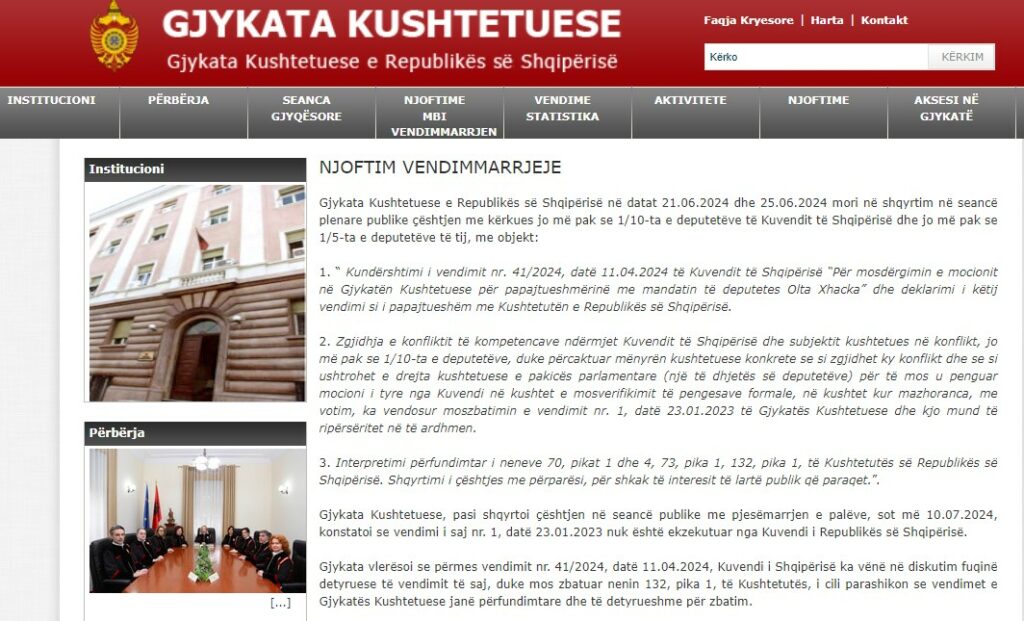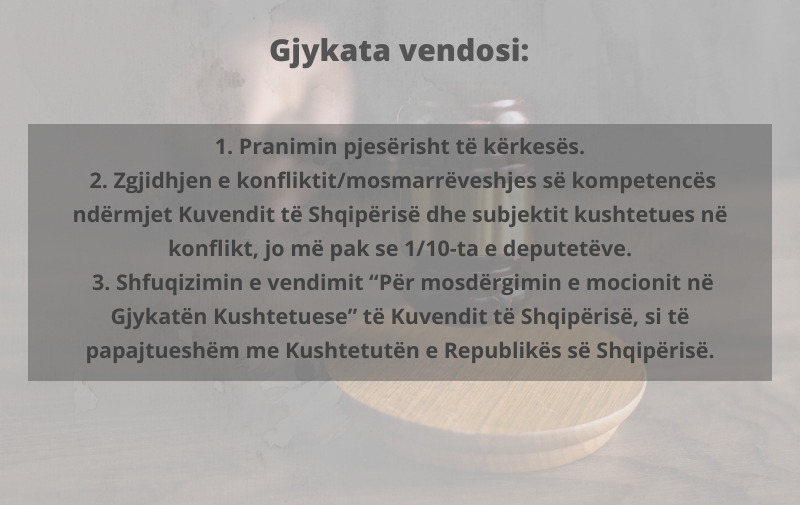Olta Xhaçka’s Mandate Saga Approaches Resolution The Constitutional Court has rejected Deputy Olta Xhaçka’s assertion that her case was fully adjudicated and that there was no need for Parliament to take action before the matter could be reviewed. The Court has now directed Parliament to submit the motion concerning the incompatibility of Xhaçka’s mandate for examination. Compliance with this order is a mandatory legal obligation.
Nevila Gjata
‘I have been to the Constitutional Court; my case has been judged on its merits, not on procedural grounds. If it had been procedural, it would have been dismissed in the deliberation room. The defense was heard for 10 hours, and a decision was made to adjourn. On April 11, 2024, Olta Xhaçka asserted on Top Story.
‘However, this statement is now contested by the Constitutional Court. The Court has mandated that the Albanian Parliament must submit the motion regarding Olta Xhaçka’s mandate incompatibility for review.
On July 10, 2024, the Court issued a directive for Parliament to present the motion concerning Xhaçka’s mandate incompatibility for examination.
The Constitutional Court has issued a clear legal directive to Parliament, emphasizing that no one is above the law.
‘None can choose to disregard the decision of the Constitutional Court. The authority of the Constitutional Court’s decisions is equivalent to that of the law. Failing to enforce a Constitutional Court decision means failing to uphold the Constitution and the law,’ stated Holta Zaçaj, the Chair of the Constitutional Court, as she read the decision aloud for three minutes.
What decision had Parliament failed to implement? Simply put, on January 23, 2023, the Constitutional Court accepted a request from a group of deputies from the Democratic Party to review Olta Xhaçka’s mandate.
Subsequently, Parliament, with the majority support of the Socialist Party, decided ‘Not to forward the motion concerning Olta Xhaçka’s mandate to the Constitutional Court.
A second group of Democratic Party deputies, led by Gazment Bardhi, contested the earlier decision and requested that the Constitutional Court declare it unconstitutional.
This motion addressed the parliamentary procedure for determining the validity and termination of Olta Xhaçka’s mandate.
During the public session at the Constitutional Court, Gazment Bardhi also sought a resolution to the conflict of competencies between Parliament and the constitutional entity involved. He requested clarification on how the constitutional right of the parliamentary minority (at least one-tenth of the deputies) to have their motion considered should be exercised without being obstructed by Parliament. The Constitutional Court agreed to review this request.
During the public session, Parliament’s legal representative contended that, contrary to the opposing claims, Parliament had indeed complied with the Constitutional Court’s decision. He explained that deputies had thoroughly examined the matter, from the Rules Committee through to the plenary session, and concluded that the formal criteria for referring Olta Xhaçka’s mandate to the Constitutional Court were not fulfilled.
The Constitutional Court, however, reached a different conclusion.
Conclusion

After reviewing the case in a public session with all parties involved, the Constitutional Court found that the Albanian Parliament had failed to implement the decision to refer Olta Xhaçka’s mandate to the Constitutional Court.
The Court concluded that by not acting on its ruling, the Parliament undermined the binding nature of Constitutional Court decisions. This non-compliance breached Article 132, Paragraph 1 of the Constitution, which mandates that Constitutional Court rulings are final and must be enforced.
‘The Court reaffirmed that its rulings have the force of law, and no authority has the right to dispute or ignore them. The undeniable impact of its decisions is such that it imposes the binding force of its rulings on all state organs. The binding nature of its decisions applies to both the command and the rationale provided – stated the decision.
It further clarified that the decision requiring Parliament to submit the motion from 1/10 of the deputies regarding the incompatibility of a deputy’s mandate to the Constitutional Court, as per Article 70 of the Constitution, must be adhered to.
‘This means that Parliament (its deputies) is required to vote according to the Court’s directive. This voting process is not a standard parliamentary procedure but is part of implementing the Court’s decision and does not pertain to the non-binding principle of the deputy’s mandate.’
In light of this, the Court, by a majority vote, decided:

The Court has mandated that the Assembly promptly send the motion concerning the incompatibility of Deputy Olta Xhaçka’s mandate to the Constitutional Court.
But when? The Chair of the Constitutional Court did not provide specific deadlines.
‘It is up to the political sphere to decide whether they will comply with our directive to prioritize this issue. We have not set any deadlines…’ said Chairwoman Holta Zaçaj following media inquiries.
(The second request from the DP group related to the need for the Constitutional Court to issue a final interpretation of Articles 70, paragraphs 1 and 4; 73, paragraph 1; and 132, paragraph 1 of the Constitution, and to specify the responsibilities of deputies in cases where the implementation of a Constitutional Court decision is obstructed.)
At the end of her brief statement on this issue, Zaçaj also clarified another point regarding Olta Xhaçka’s mandate.
At the same time, the court has rejected the latest request from the Socialist Party submitted through the Assembly.
The Assembly had asked the Constitutional Court to reopen the judicial review concerning Xhaçka’s mandate, with the aim of seeking an advisory opinion from the Venice Commission.
The request was made based on the argument that Albanian legal experts are facing legal uncertainty regarding this matter.
‘In the situation where there is legal uncertainty about why a group of no less than 1/5 of the deputies cannot initiate action with the Constitutional Court contrary to the current constitutional order, the Assembly believes it is necessary to request an advisory opinion from the Venice Commission,’ said the Assembly’s request to the Constitutional Court.
The Chair of the Constitutional Court announced that this request had been denied.










